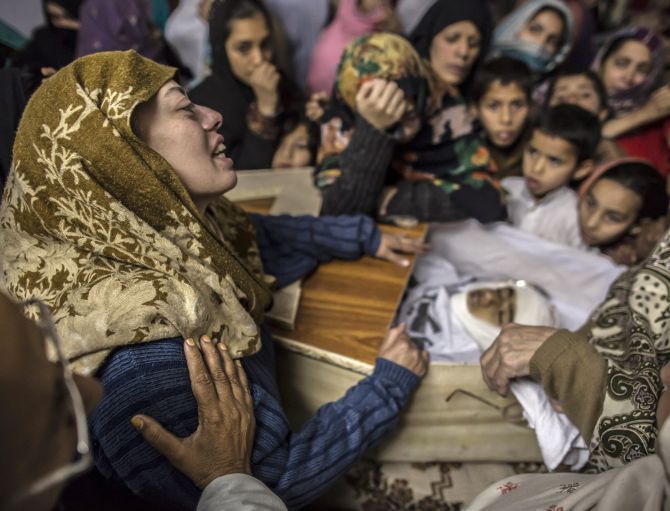'Pakistan is paying the price for ignoring secularism. In seeking to be ever more Muslim to define its nationhood, it has become a terrorist haven,' says Amberish K Diwanji.
 Pakistan and the world watched in horror as some 131 children were massacred by a bunch of terrorists who claimed to be acting in the name of Islam.
Pakistan and the world watched in horror as some 131 children were massacred by a bunch of terrorists who claimed to be acting in the name of Islam.
The Tehreek-i-Taliban Pakistan chose the same date when the Pakistani army in what is now Bangladesh surrendered to the Indian Army and the Mukti Bahini 43 years ago.
While the causes for the two wings of Pakistan breaking up are many, the key provocation for the 1971 war was the refusal of (West) Pakistani politicians to accept the election results that gave victory to Mujibur Rahman (of East Pakistan) and later the (West) Pakistani army's brutal crackdown on the (East) Pakistani people.
When the war ended, Bangladesh was born as an independent nation.
Comparing India and Pakistan is passe, so let us compare these two countries separated on December 16, 1971.
When Bangladesh was created, it was terribly impoverished, over and densely populated, and lacking in industries. Its per capita income was extremely low and population growth rate, high.
Not surprisingly then, there were many who believed that Bangladesh lacked the resources to survive as an independent country and would soon go under. And its early years gave little confidence to the rest of the world.
On the other side, the same pundits also believed that Pakistan, without the 'burden' of Bangladesh, would bloom. It was economically better off, was close to West Asia, and had a stronger industrial base when compared to its estranged sibling.
In fact, it may be pertinent to recall that all through the 1950s and 1960s, Pakistan had a higher per capita income and growth rate than even India, giving birth to the belief that Pakistan was more likely to prosper than even India. Losing Bangladesh actually improved its odds of becoming a developed nation.
Yet today, Pakistan is the biggest loser of the subcontinent. For all its problems, Bangladesh is doing just fine. Sure, its battling begums (Sheikh Hasina and Khaleda Zia) caused terrible chaos on the streets (and if their battle flares up again, Bangladesh is headed for trouble), but despite them (or perhaps because of them) this nation has improved over the years.
Its population growth rate has been declining, its per capita income increasing. Its healthcare policies hold lessons for all nations, India included. From exporting only jute it now exports textiles and this nation is yearning to be counted as a Southeast Asian tiger.
Pakistan, on the other hand, went down a spiral of disaster, made by its misguided policies that depended on religion, and religion alone, for salvation. This country is now in the grip of religious fundamentalism, its economy has little to boast about. It is a poor country with a nuclear bomb, bomb made from stolen technology.
So why did Bangladesh succeed and Pakistan flounder?
There are many reasons, but perhaps the most important reason for the difference is secularism. Bangladesh chose to be a secular nation, like India. And like India, its secularism is far from perfect. There have been horrendous reports of forced conversions and attacks on minorities (Hindus, Buddhists). But as a political dogma, Dhaka never allowed the mullahs to run riot.
Then, nearly two years ago, the people of Bangladesh held protests at Shahbagh chowk, forcing the government to act against the fundamentalist leaders who had had sided with (West Pakistan) and killed and raped thousands (many of them Hindus) during the 1971 war.
Choosing secularism, flawed as it may be, has its own rewards.
On the other hand, Pakistan is paying the price for ignoring secularism. In seeking to be ever more Muslim to define its nationhood, it has become a terrorist haven.
Today, in the name of Islam, Muslims target non-Muslims and Ahmadiyas, Sunnis kill Shias (which means M A Jinnah, Pakistan's founder, would have been a potential target), and fundamentalists attack all others.
The attackers always choose easy targets: Worshippers at a mosque, travellers on a bus on the highway, and, as we saw on December 16, school children at a school in Peshawar.
In Pakistan, a politician who spoke out against the blasphemy law was shot dead. Worse, lawyers applauded the killer when he was produced in court. Contrast this with Shahbagh and you can see the difference between these two countries.
The roads taken by Pakistan and Bangladesh have taken since 1971 holds important lessons for all nations in the subcontinent and the world: Religion in politics does not work.
Secularism is, of course, not a panacea in itself; development, democracy, respect for institutions play crucial roles. But what secularism does is put the focus on those issues without bringing in the disruptive elements of religion and religious extremists.
Religious leaders draw maximum support from the poor and uneducated. No wonder then that they really don't care about development.
News reports say Muhammad Sayeed of the Lashkar-e-Tayiba and Pervez Musharraf, the former military dictator, blame India for the Peshawar massacre. This would have been laughable were it not so tragic.
Pakistanis remain in denial about the ill-effects of religion on their State. It has not learnt any lesson and is unlikely to do so.
The question is: Will Pakistan survive its own folly?
Image: A mother mourns her son who was killed during the attack on the Army Public School in Peshawar. Photograph: Zohra Bensemra/Reuters











 © 2025
© 2025